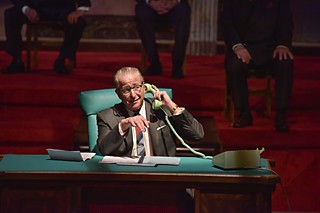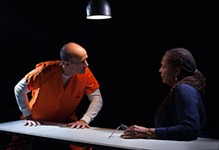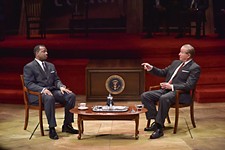The Way Home
Zach Theatre gives Robert Schenkkan's All the Way its Texas premiere on LBJ's home turf
By Robert Faires, Fri., April 10, 2015
When All the Way opened at the Oregon Shakespeare Festival in July 2012, the play's future was anybody's guess. Would any theatre besides this immense repertory company be willing to mount a political drama requiring 17 actors and running nearly three hours? Was there even a remote chance that such a show could have commercial prospects? No one knew. The only thing about All the Way's life after OSF that seemed certain – indeed, seemed downright inevitable – was that it would be produced in Austin. After all, the playwright, Pulitzer Prize winner Robert Schenkkan, grew up here and graduated from the University of Texas. Zach Theatre Artistic Director Dave Steakley was among those who saw the play early on and felt strongly that it belonged at his theatre. And, of course, the play's protagonist not only has deep roots in Central Texas, he retains a towering, even mythic presence in this city four decades after his death. That would be Lyndon Baines Johnson, 36th President of the United States. How could this play about his first year in the White House not be staged on LBJ's home turf?
This week, All the Way finally makes to the capital city, after a sold-out run at the American Repertory Theatre in Cambridge, Mass., and a box-office-busting Broadway engagement, both starring Bryan Cranston; and a run in rep with its sequel, The Great Society, at Seattle Repertory Theatre, where it was the highest-grossing production in company history. And it arrives with a pair of Tony Awards, two Drama Desk Awards, two Outer Critics Circle Awards, two Boston Theater Critics Association Awards, five Independent Reviewers of New England Awards, and the inaugural Edward M. Kennedy Prize for Drama Inspired by American History. That the play has garnered so much attention and acclaim might suggest initial concerns about its marketability were misplaced, but it's hard to imagine just any drama about the Johnson administration stirring up the frenzy this one has. Something singular's at work here.
Steakley, who's seen the play five times – once in Oregon, twice on Broadway, and twice in Seattle – felt it that first performance. "I was struck by the immediacy of the story," he says, "how vital and important Robert Schenkkan has made this play to the times in which we live. I felt like I was on the edge of my seat, even though I knew the outcomes. He's written it with a propulsion on the page which makes it work like a political thriller. I was overwhelmed by what LBJ was able to accomplish in a single year: the passage of the Civil Rights Act and laying the groundwork for the Voting Rights Act as well as the 60 education bills he passed and Great Society initiatives like the war on poverty, Medicare, Medicaid, national parks and environmental protections, the National Endowment for the Arts and Humanities, PBS, Head Start, and the list goes on and on. The very fine actors at Oregon Shakespeare Festival and Bill Rauch's inspired direction made it an experience that for me was equivalent with the thrill of seeing George Wolfe's production of Angels in America: an absolutely unforgettable theatre event that continues to stick with you and grow in its impact."
If anyone has a bead on LBJ's impact on the country and culture, it's Mark Updegrove, director of the Lyndon Baines Johnson Library and Museum, and author of Indomitable Will: LBJ in the Presidency and Destiny of Democracy: The Civil Rights Summit at the LBJ Presidential Library (the latter just published by the Briscoe Center for American History). He considers the keen interest and powerful response to this drama about Johnson "a testament to the man and the times. I view civil rights as the most important domestic movement of the 20th century, and I think we're finally getting an appreciation of how significant that movement was – what a different country the United States was a half-century ago and how important the leadership demonstrated by Martin Luther King and LBJ and others were in changing the story."
Updegrove admits to being far from a disinterested observer where All the Way is concerned, having met and befriended Schenkkan and Cranston when they visited the library for research. Then there's his relationship to the subject. "In some manner I live with LBJ every day," he says, so encountering the man onstage wasn't as revelatory as it could be for most. "I think for folks whose day jobs do not involve the very outsized personality of Lyndon Johnson, being with him for two or three hours in the theatre might be a more immersive experience."
The historian chalks his measured reaction up to an occupational hazard: "I wrote an article for Politico after Selma came out that was sort of the opening salvo in the whole debate over that film, and the first paragraph talks about the fact that when you're a historian you have to hold back your pedantic urges and allow the story to wash over you. And the best you can hope for is that the playwright or screenwriter and director have captured the essence of the story and the individuals around it. If they do that, then as far as I'm concerned, they've succeeded. Of course, they're going to use creative license in order to serve their narrative. You expect that. But by that standard, Robert did a good job of capturing the different challenges that LBJ faced from the beginning of his presidency, his championing of the Civil Rights Act of 1964 and his challenges in winning the presidency in his own right the same year. I appreciated Robert's sense of history and his grasp of the facts of the administration. And he didn't use a great deal of creative license, as others might be tempted to when looking at a story as Shakespearean as the story of Lyndon Johnson. I don't know if it's LBJ meets King Lear or King Lear meets LBJ, but it's somewhere in between. Robert does a good job of capturing LBJ – who is a very difficult man to capture because he had so many different facets. Those who were around him, everyone saw a different man in many respects."
As Steakley has been working on All the Way's Texas premiere, he's become quite conscious of Johnson's many personalities, echoing Updegrove that "everyone has a different perception of who Johnson was because he was a master of transformation based on whomever he was dealing with." Steve Vinovich, who was Cranston's understudy but is only now getting to step into Lyndon's boots, was told by former Johnson aide Bill Moyers that "LBJ was 13 of the most interesting people he ever met." That makes Johnson "a remarkable character to play," says Steakley. "We hope we've captured the essence of the man through all of the interviews and research and footage and recordings we have been poring over for months. When Steve and I visited with various associates who knew LBJ very well, like Larry Temple [special counsel to LBJ during his presidency] and Harry Middleton [staff assistant, speechwriter, and the first director of the LBJ Library], we found their accounts of what he was like privately, as well as from day to day in the White House, counters much of what's been written about him and made for an even more complex portrait that changed the character that Steve and I are seeking to build onstage.
"There were times in the rehearsal process when we were trying to implement some of these characteristics, and some were successful and some had to be abandoned because they were choices that did not support what Robert Schenkkan wrote. Robert has been very clear that this is a play and not a documentary, so theatrical license has been employed to tell the story and relate private conversations that aren't on record. We have to tell the story he has written and do our best to inform it with everything we have learned about LBJ."
Steakley is also keenly aware that as they do, they'll be watched by many people who knew LBJ and Lady Bird personally, a prospect that's "incredibly intimidating and very exciting at the same time." He adds, "I think all of us who are native Texans are sensitized to portrayals of Texans that lack authenticity and are used to seeing plays and movies that get it wrong. I feel a tremendous amount of responsibility around this issue. I've been down this path of putting real-life people who are well-known onstage before, and it is tricky because you are dealing with people's beloved personal memories. And that is also the joy of a play like this, because Central Texans will come to this play with tremendous investment in what is portrayed and how it is realized. It is a subject we care about and that always makes for an exciting night in the theatre.
"Jack Willis, who premiered the play at OSF, and Bryan Cranston, who performed the role on Broadway, were both incredible as LBJ, and yet their interpretations were very, very different. Steve is very different from either of them. I agonized over this casting for months, but as I said to Robert, Steve is absolutely the right actor to do this play in Austin, and I can't imagine anyone better suited to bring LBJ to life for our highly attuned audience. It is a privilege and an honor to get to tell a story we are so passionate about, and I look forward to all of the conversations this play will open."
For the Zach artistic director, those conversations always come back to civil rights and the immediacy in All the Way. "As I've spent time with the play, I am in awe that a 30-year-old black preacher and a president from a very modest beginning could have the savvy, and strategy, and cojones to make that happen, amidst the coordination of an infinite number of issues and personalities within both sides of the movement.
"There is a scene depicting the funeral of James Chaney, the young African-American civil rights worker who was murdered during Freedom Summer by the Ku Klux Klan in Mississippi. Reverend King leads the service, and he's interrupted by David Dennis, a young civil rights worker who had lent his station wagon to Andrew Goodman, Michael Schwerner, and Chaney the day they disappeared. Feeling the full weight of his grief, Dennis gives a moving and powerful, spontaneous speech to the assembled congregation, and Delante Keys, who is new to Austin, delivers it in a way that is urgent, heartbreaking, and unforgettable. The speech sounds like it was written today because it is exactly what we are hearing our African-American friends express now in the Black Lives Matter movement. It never fails to choke me up. It is a call to action for all of us to get this resolved once and for all for our friends and neighbors. It's abhorrent that Dennis' words would still have resonance more than 50 years later. We have got to do better as a nation."
All the Way runs April 8-May 10, Wednesday-Saturday, 7:30pm; Sunday, 2:30pm, at the Zach Topfer Theatre, 202 S. Lamar. For more information, call 512/476-0541 or visit www.zachtheatre.org.













